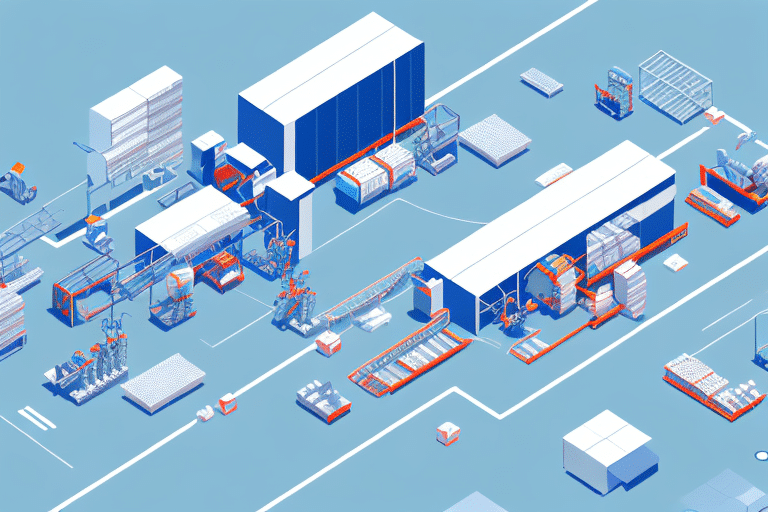A Comprehensive Overview of Dematic Warehouse Automation Software for E-Commerce Shippers
As e-commerce continues to experience exponential growth, customer expectations for faster and more efficient delivery have never been higher. To meet these demands, many companies are turning to warehouse automation software to streamline their operations. Dematic's warehouse automation software is specifically designed to cater to the needs of e-commerce shippers. This article provides an in-depth analysis of the key features, benefits, architecture, best practices for implementation, and a cost analysis of the return on investment (ROI) associated with Dematic's software.
The Growing Need for Warehouse Automation in E-Commerce
The e-commerce sector has revolutionized the retail landscape, offering customers unparalleled convenience, competitive pricing, and a vast array of product choices. According to a report by Statista, global e-commerce sales are projected to reach $6.54 trillion by 2023. However, this rapid growth presents significant challenges in meeting customer expectations for swift and accurate deliveries.
Warehouse automation software addresses these challenges by automating key warehouse operations, thereby reducing order processing times and enhancing overall efficiency. Studies indicate that businesses implementing automation can achieve up to a 20% increase in order accuracy and a 30% reduction in fulfillment times (McKinsey & Company).
Key Features of Dematic's Warehouse Automation Software
Automated Inventory Management and Tracking
Dematic's software offers robust inventory management capabilities, allowing real-time tracking of stock levels. This minimizes the risk of stockouts and overstocking, ensuring optimal inventory levels are maintained.
Order Processing and Picking Automation
The software automates the order picking process, reducing human error and speeding up order fulfillment. Features such as automated guided vehicles (AGVs) and robotic pickers streamline these operations.
Machine Learning and Predictive Analytics
Incorporating artificial intelligence, the software analyzes data trends to predict future demand, enabling smarter inventory management and efficient resource allocation.
Real-Time Visibility and Reporting
With comprehensive dashboards and reporting tools, businesses gain real-time insights into warehouse operations, facilitating informed decision-making and performance optimization.
Scalability and Customization
Designed to grow with businesses, Dematic's software is highly scalable and customizable, accommodating the evolving needs of e-commerce shippers without significant additional investments.
Benefits and Efficiency Gains
Implementing Dematic's warehouse automation software yields numerous benefits, including:
- Increased Efficiency: Automation of repetitive tasks leads to faster order processing and higher throughput.
- Enhanced Accuracy: Reduced human intervention minimizes errors in order fulfillment and inventory management.
- Cost Savings: Lower labor costs and optimized resource utilization contribute to significant cost reductions.
- Improved Customer Satisfaction: Faster and more accurate deliveries enhance the overall customer experience.
According to a BPI Connect report, companies utilizing warehouse automation can see a 10-15% increase in productivity and a 25% reduction in operational costs.
Architectural Design and Scalability
Dematic's warehouse automation software is built on a modern, cloud-based architecture, facilitating seamless integration with existing supply chain management systems. The modular design allows businesses to implement specific functionalities as needed, ensuring scalability and adaptability.
Cloud-Based Integration
The cloud infrastructure provides robust data security and enables real-time data synchronization across multiple platforms, enhancing operational transparency and coordination.
Modular Architecture
Businesses can customize the software by adding or removing modules based on their specific requirements, ensuring flexibility and scalability as operations expand.
Research by Forrester highlights that scalable software architectures are crucial for accommodating business growth and adapting to market changes.
The Role of Artificial Intelligence and Machine Learning
Artificial intelligence (AI) and machine learning (ML) are at the core of Dematic's warehouse automation software, driving intelligent decision-making and process optimization.
Demand Forecasting
AI algorithms analyze historical sales data and market trends to forecast demand, enabling proactive inventory management and reducing the risk of stockouts.
Process Optimization
Machine learning models continuously learn from operational data to optimize picking routes, streamline workflow, and enhance overall warehouse efficiency.
Sustainability Benefits
By optimizing resource allocation and minimizing waste, AI-driven automation contributes to more sustainable warehouse operations, aligning with environmental goals.
A study by Supply Chain Digital indicates that AI can improve supply chain efficiency by up to 40%, highlighting its transformative potential.
Integration with Supply Chain Management Systems
A key advantage of Dematic's warehouse automation software is its seamless integration with other supply chain management systems, such as transportation management and enterprise resource planning (ERP) systems.
Transportation Management Integration
Integrating with transportation management systems allows for synchronized planning and execution of shipping operations, reducing delays and optimizing transportation routes.
ERP System Compatibility
The software's compatibility with leading ERP systems ensures synchronized data flow across departments, enhancing overall business coherence and reducing operational silos.
Effective integration is essential for creating a unified supply chain, as emphasized by Harvard Business Review, which states that integrated systems lead to significant improvements in supply chain transparency and responsiveness.
Cost Savings and ROI Analysis
Investing in Dematic's warehouse automation software can lead to substantial cost savings and a favorable return on investment (ROI). Key areas of cost reduction include:
- Labor Costs: Automation reduces the need for manual labor, lowering payroll expenses.
- Operational Efficiency: Streamlined processes decrease the time and resources required for order fulfillment.
- Error Reduction: Increased accuracy minimizes costs associated with order returns and corrections.
According to a Gartner report, companies implementing warehouse automation can achieve an ROI within 12-18 months, depending on the scale of implementation and existing operational efficiencies.
Moreover, enhanced customer satisfaction resulting from reliable and speedy deliveries can lead to increased customer loyalty and higher sales volumes, further contributing to the ROI.
Best Practices for Implementation and Utilization
Successful implementation of Dematic's warehouse automation software requires strategic planning and adherence to best practices:
Comprehensive Project Planning
Develop a detailed project plan outlining objectives, timelines, and resource allocations to ensure a smooth implementation process.
Stakeholder Involvement
Engage all relevant stakeholders, including warehouse staff and management, to foster collaboration and address potential concerns early on.
Employee Training
Provide thorough training to ensure that employees are proficient in using the new system, maximizing its benefits and minimizing resistance to change.
Continuous Monitoring and Optimization
Regularly monitor system performance and gather feedback to identify areas for improvement, ensuring the software continues to meet evolving business needs.
Adhering to these best practices can significantly enhance the effectiveness of warehouse automation initiatives, as supported by insights from Supply Chain Digital.
Choosing the Right Dematic Software Package for Your E-Commerce Business
Dematic offers a range of warehouse automation software packages tailored to the diverse needs of e-commerce businesses. When selecting the appropriate package, consider the following factors:
- Business Size and Growth Projections: Choose a package that can scale with your business growth and accommodate increasing operational demands.
- Specific Operational Needs: Identify the key functionalities required, such as inventory management, order processing, or advanced analytics, and select a package that addresses these needs.
- Budget Constraints: Assess your budget to find a package that offers the best value while meeting essential requirements.
- Implementation Timeline: Consider the timeline for implementation and ensure that the chosen package aligns with your operational schedules and deadlines.
Consulting with Dematic's team of experts can provide valuable guidance in selecting the most suitable software package and ensuring a successful implementation tailored to your specific business needs.
In summary, Dematic's warehouse automation software presents a comprehensive solution for e-commerce shippers aiming to enhance efficiency, reduce costs, and elevate customer service standards. By leveraging advanced features, integrating seamlessly with existing systems, and adhering to best implementation practices, businesses can achieve significant operational improvements and a strong competitive edge in the dynamic e-commerce landscape.




















